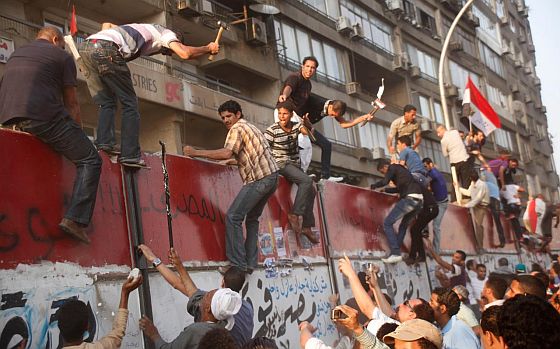![]()
Thu, Sept 15, 2011 | By Jared Feldschreiber
Embassy Attack: The enemy of our enemy is our friend
Israeli advocacy groups often lament that the world hates Israel. These organizations will also never say publicly that they would ever “cheer on” an Arab military. But alas, as any student of the Middle East learns quickly about the region: the enemy of your enemy is often your friend. This perhaps surmises Egypt well in the post-Mubarak era even as the Egyptian military is not an enemy of Israel‘s, rather a tacit and crucial partner.
Does the Egyptian military have deep-seated Zionist roots? Of course it does not — nor does it need to, but its citizens will face chaos and unspeakable bloodshed if the peace treaty does not hold. Quietly, there is great cooperation between the two sides, even as it has gotten more dangerous. Hamas operates and controls Gaza, and there also remains an Al Qaeda presence there, often coordinating with the Bedouins within the Sinai Peninsula to commit attacks against Israel like last month’s terror attack killing 8 Israelis. Israel has expressed particular concern that the Egyptian military has been distracted by persistent domestic problems.
Israel must continue to work with the Egyptian army, as it remains the last remnant of the Hosni Mubarak regime, which was ousted from power in February.
Last week’s attack on its Israeli Embassy in Cairo remains a blight by the Egyptian military but ultimately order was restored, and Israel will soon bring its ambassador Levanon back to Cairo.
“An attack against an embassy — an independent entity that has full immunity — is not something that happens everyday: it is very much the exception, and very dangerous. This is a serious matter,” said Levanon.
Levanon however stated that “this doesn’t mean we will forget what happened. We will continue to check what happened and investigate, because it is very serious.”
Levanon said that while it was clear that the anti- Israeli sentiment in the street in Egypt was not going to stop, “every country which has sovereignty has certain obligations, one of those being to protect embassies and their personnel.” Asked about the depth of hatred for Israel in Cairo that this incident unmasked, Levanon said, “the Egyptians have to be aware of the negative effects of this kind of animosity. We have a peace treaty, an accord, between both countries.”
While the Israel-Egypt peace treaty remains fragile, and the peace between the two nations has been cold for over thirty years, today it is evermore crucial, serving to maintain stability in this anarchic region. It is true that those who committed this heinous storming of the embassy were a bunch of hooligan soccer fan-thugs and do not represent the Egyptian protesters in January and early February seeking domestic reform. Anarchy after the fall of Mubarak should have been predicted; instead an arrogant and ignorant Western media chose to liken these protests to some sort of Arab-Velvet Revolution led by Vaclav Havel about 22 years ago in Czechoslovakia.
Often times, pundits in the news media like to say that every Arab country is different and wholly unique, and that they should not be lumped together. Yet that is exactly what they do.
Supporters of Israel ought to be rooting for the Egyptian military as they also work to promote progressive reforms put forth by ordinary Egyptians to help facilitate the needs for reform. They are seeking better lives for themselves. Yet, the sentiment in these protests could lead to anarchy if order is not restored, as Islamists can hijack it.
The Egyptian military certainly feels they should not abandon the 3 billion-plus worth of dollars foreign aid supplied to them by the US. Sadat was surely no Zionist; nonetheless he bravely traveled to Jerusalem in 1977 to pursue peace with Israel. He understood the rules of the land, understanding the advantages of playing nice to the US, getting massive aid, Sinai and preserving a sense of regional stability.
In this anarchic region, one must remember the cardinal maxim; the enemy of our enemy is often our friend.
Jared Feldschreiber, a native New Yorker is a journalist and writer. His articles mostly deal with international affairs, and had spent over a year working in the Jerusalem Bureau with Fox News. Many of his articles have published with different newspapers and journals concerning Israel and American human interest stories. He has his Masters Degree from Tel Aviv University in Security and Diplomacy studies.



 RSS
RSS











Embassy Attack: The enemy of our enemy is our friend | Middle East News, Articles, Background, Opini http://t.co/qjbUeHo6
Embassy Attack: The enemy of our enemy is our friend | Middle East News, Articles, Background, Opini http://t.co/qjbUeHo6
http://t.co/lDV3oLYk Embassy Attack: The enemy of our enemy is our friend | Middle East …
As often Jared has written an interesting yet spurious article. It seems it is impossible for him to seperate his personal beliefs from fact. He makes connections to events throughout history which while important are not all related, thus creating these conspiracy theories. It is as though he doesnt realize that everything is not occuring in a vaccum. Again,he does have many correct facts. Basically, yes it seems it would be great for Israel if the peace treaty were kept but it doesnt at all mean that it is in the Egyptian civilian populations’ interest to befriend Israel. What would be in there best interest would be establishing a democracy that suits them, but understandably sadly, doesnt benefit Israel, because that is not the sentiment of the population.